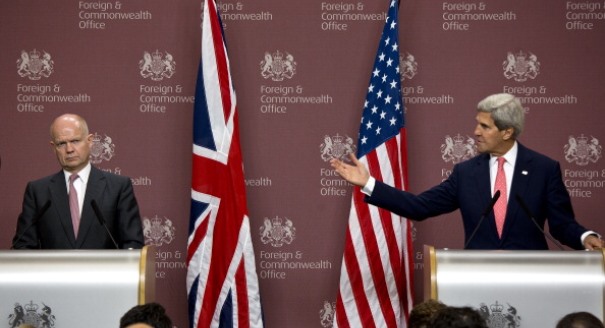Ten years ago, in the run-up to the U.S. invasion of Iraq, Europeans were deeply divided.
The weekly meetings of the North Atlantic Council, NATO’s main decisionmaking body, degenerated into shouting matches between the U.S. and the French ambassadors. The EU retreated into itself, while “old” and “new” Europe each adopted the high moral ground over Iraq.
The stance that Europe’s leaders took in 2003 at least reflected public opinion in their countries. France, Germany, and the Benelux countries (“old” Europe) gathered on one side of the divide. Along with Russia, they openly opposed the U.S.-led invasion. On the other side were the countries of Eastern Europe, Britain, Spain, Portugal, and Italy (“new” Europe).
Those divisions, which almost tore NATO apart and dealt a battering to the EU’s foreign and security policy, took a long time to overcome. They revealed how hollow NATO and the EU had become on strategic thinking and common purpose.
Today, the situation seems even worse.
As the death toll in Syria mounts, with civilians murdered with chemical weapons, Europe is in even worse shape strategically than in 2003. The most important countries—Britain, France, and Germany—have failed to project any kind of European leadership.
It was Russia, and not any European nation, that this week proposed putting Syria’s chemical weapons under international supervision. This says a lot about the EU’s lack of a strategic response to such a fundamental security policy issue as the alleged use of chemical weapons by Syrian President Bashar al-Assad.
David Cameron, the British prime minister, believed he was providing leadership by being gung-ho for military action against Syria. But he was forced to back away from that position after his humiliating defeat on the issue in the House of Commons two weeks ago. François Hollande, the French president, who was just as bellicose as Cameron, has had to mellow his stance too.
As for Germany, Chancellor Angela Merkel, who is facing reelection on September 22, has successfully played for time. She has been calling for a political solution and waiting for the UN inspectors to release their findings about the chemical weapons attacks.
At least Merkel has been consistent. Ever since the beginning of the Syrian civil war, she has never swerved from referring to the need to involve the UN Security Council, knowing perfectly well that it could never sanction the use of force because of the likely Russian and Chinese vetoes.
She has never swerved, either, from calling for a diplomatic solution to be kept on the table, even though talks have so far proved ineffective.
She has never referred to redlines. She knew what U.S. President Barack Obama had yet to discover: how immensely difficult it is to make good on any such threat.
Above all, she has never lost sight of the German public’s position on the Syrian crisis. Opinion polls repeatedly show that Germans are staunchly opposed to any military intervention in Syria.
Even the chemical weapons attack did not change the public’s mind. This is despite the Germans’ loathing of such weapons and their historical connotations, as well as Germany’s commitment to disarmament and upholding international weapons treaties.
Cameron and Hollande, in contrast, lost sight of how war-weary their voters are and how anti-American they have become.
The British in particular have seen far too many body bags return from the wars in Iraq and Afghanistan. Every public-opinion poll shows that the British are not prepared to back the United States with troops again, especially since the Obama administration was going to bypass the UN Security Council.
As for Hollande, who had won so much praise for sending French troops into Mali earlier this year, perhaps he believed he could repeat that show of resolve over Syria. But, like Cameron, he misjudged the public’s mood. The French are opposed to any kind of military action against Syria. Now, Hollande’s opponents are accusing him of being America’s lackey.
What this means is that the leaders of Europe’s two most important military powers have acted totally out of sync with their publics. Voters in the UK and France seem increasingly German in outlook: cautious, pacifist, inward-looking, and critical of Obama’s foreign policy. The same can be said of many other European countries.
These trends point to a new Europe in which the political resolve for serious diplomacy is lacking, and the conviction to enforce international weapons conventions, if necessary, is absent. Europeans, including NATO allies, have even eschewed the noble and humanistic principle of the responsibility to protect.
If the Iraq War highlighted the divisions between “new” and “old” Europe, Syria has exposed another kind of new Europe devoid of any strategy.






.jpg)